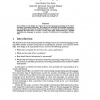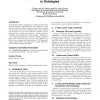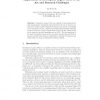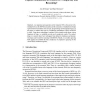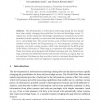SIGLEX
1991
14 years 4 months ago
1991
One problem in the design of a lexicon for natural language processing is the representation of semantic knowledge. We examine the adequacy of knowledge representation formalisms ...
ATAL
2006
Springer
14 years 4 months ago
2006
Springer
In multiagent systems ontologies are essential because they facilitate tasks like communications and reasoning. In this paper, inspired by studies in cognitive psychology, we pres...
LPAR
1999
Springer
14 years 4 months ago
1999
Springer
Abstract. Description Logics (DLs) are a family of knowledge representation formalisms mainly characterised by constructors to build complex concepts and roles from atomic ones. Ex...
SAC
2010
ACM
14 years 5 months ago
2010
ACM
Hermes is an ontology-based framework for building news personalization services. This framework consists of a news classification phase, which classifies the news, a knowledge ...
SEMWEB
2004
Springer
14 years 5 months ago
2004
Springer
Semantic Web resources — that is, knowledge representation formalisms existing in a distributed hypermedia system — require different addressing and processing models and capac...
TABLEAUX
2005
Springer
14 years 6 months ago
2005
Springer
Abstract. Description Logics (DLs) are a family of logic based knowledge representation formalisms. Although they have a range of applications (e.g., configuration and information...
ICCS
2005
Springer
14 years 6 months ago
2005
Springer
Abstract. Description Logics (DLs) are a family of class based knowledge representation formalisms characterised by the use of various constructors to build complex classes from si...
SEMWEB
2007
Springer
14 years 6 months ago
2007
Springer
Abstract. An important open question in the semantic Web is the precise relationship between the RDF(S) semantics and the semantics of standard knowledge representation formalisms ...
FROCOS
2009
Springer
14 years 7 months ago
2009
Springer
The developments in information technology during the last decade have been rapidly changing the possibilities for data and knowledge access. To respect this, several declarative k...
PADL
2010
Springer
14 years 9 months ago
2010
Springer
Abstract. Ontologies and rules are usually loosely coupled in knowledge representation formalisms. In fact, ontologies use open-world reasoning while the leading semantics for rule...
